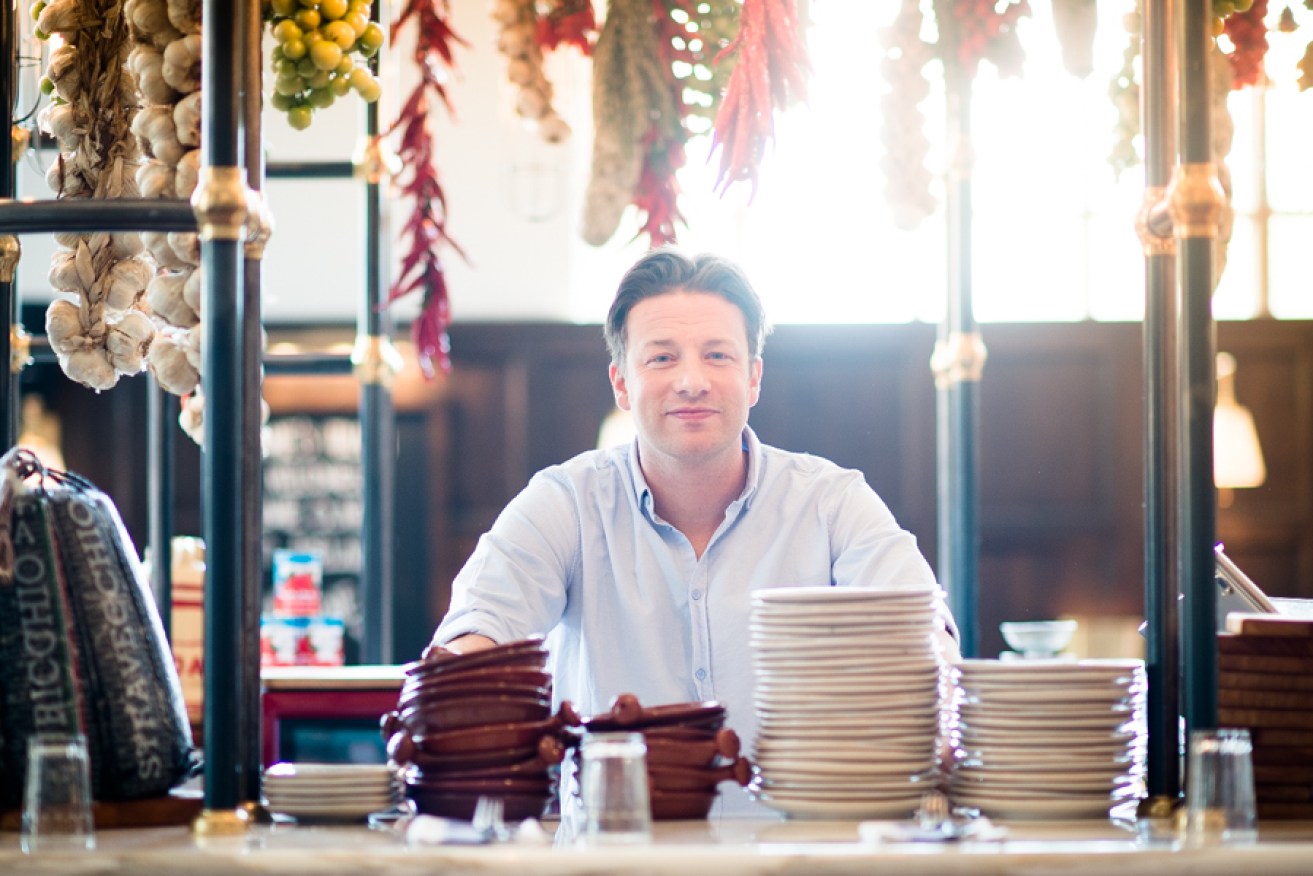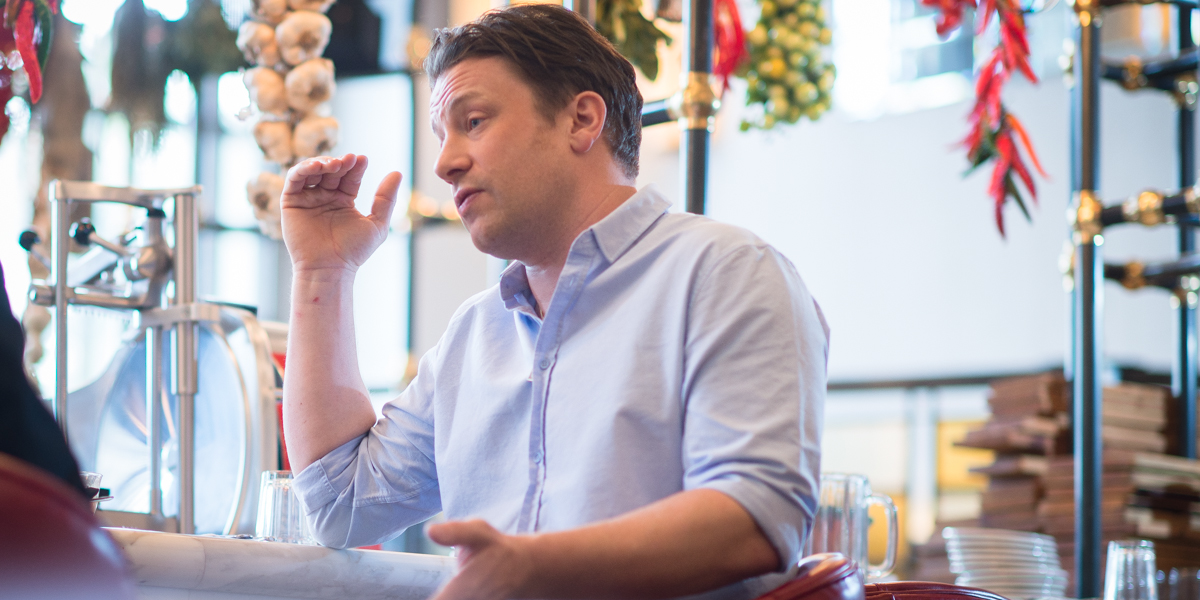Jamie Oliver in Adelaide: this feels like home


Jamie Oliver in his Adelaide restaurant today. Photo: Nat Rogers/InDaily
Jamie Oliver, straight off a plane from Hong Kong and sitting in his Adelaide restaurant for the first time, seems totally at ease.
Perched on a stool in the grand room of the former bank building on the corner of King William Street and North Terrace, he points out the features he designed, and the crockery he commissioned from his Portuguese flowerpot maker.
Even though this is just one in a string of Jamie’s Italian restaurants all over the world, he says many things are instantly recognisable.
“It’s sort of like your genetics are all over the place – all the little decisions that have been made,” he tells InDaily.
The 39-year-old father of four has come to hold a rare place in the world of celebrity chefs.
He has become, arguably, the biggest of them all – maybe the most popular and well-known chef ever.
This vast popularity is probably why his visit hasn’t been broadcast far and wide. He’s in South Australia just for the day, stopping to meet the staff at Jamie’s Italian, which opened last September, before going to his “Ministry of Food” project in Adelaide’s southern suburbs.
He’s doing just a couple of interviews – one with us – before moving on to the rest of his Australian tour.
The restaurant, he says, is very familiar.
“It really does feel like home – even meeting the team today,” he said.
“When I walked into the room today, there were about 100 staff and I can recognise it all. I can recognise it and see it in (my) different Aussie restaurants and around the world. We always want someone with a bit of a spark in their eye and get people to feel really proud.”
Oliver’s fame is built on an unusual foundation. From the very earliest days of his public career, he started projects that took a broader view of society, rather than just selling cookbooks, making TV shows and putting his name to restaurants.
In 2001, he opened the first Fifteen restaurant to provide training to young people – many of them from very troubled backgrounds – who were not in full-time education or employment. In 2004, he embarked on his first attempt to improve the way young people eat, exposing the poor quality of food fed to British school children under official programs.
The Italian chain began a few years later, in partnership with his mentor Gennaro Contaldo, along with a proliferaton of programs to improve the quality of supermarket food, and teach people to cook and grow nutritious food.
His “Ministry of Food” and “Food Revolution” projects are about getting people to learn to cook nutritious food – to end the diet-related health problems gripping the western world.
In some ways it’s a career based on empathy – empathy with a massive audience that he had in the palm of his hands almost from the beginning of his TV career with the series, “The Naked Chef”.
After growing up in the family restaurant business, and struggling fiercely with dyslexia at school, Oliver says he found himself strangely uncomfortable after his first book, written on the back of bags, and dockets and scraps of paper, sold millions.
“I was weirdly uncomfortable,” he tells InDaily. “My dad was proud but also weirdly uncomfortable. And I was also enthusiastic – over enthusiastic – super naive and romantic.”
In response, he hatched a plan to set up Fifteen – which was opposed by his father and actually caused a falling out for some time.
“But it was one of the best things I had ever done,” he said.
He became a father at about the same time, which spurred his predilection for social action even more.
“Then I started realising with my kid – who was in my arms – every time I saw the little toe-rags at the end of the street, instead of thinking they were little toe-rags, I started thinking they were someone else’s kid. It really affected me.
“Then it went on to School Dinners and it’s never really stopped since then.
“So it was almost an awareness of my audience.”
The use of food as a mechanism for social change is something he impressed upon his local staff in Adelaide today.
“I spoke to the guys this morning. Food is such a platform for goodness. People that produce good product are always good people – you’ll find no arseholes that produce good product.”
Oliver knows that he’s built up social capital – through consistency, he argues – and has no plans to stop campaigning to help children eat better food.
“Unlike (Gordan) Ramsay, I haven’t been up and down like a yo-yo – I’ve been consistent at what I do and how I do it.”
He doesn’t like to describe himself as a brand – although he says he fully understands that he has a responsibility to a work that goes beyond himself.
And he remains ambitious about what he can do with this power. His next project is a global petition to the G20 group of countries to ensure all children are provided with food education.
One of his food heroes, Australian Stephanie Alexander, has had some success in this country in providing hands-on food education with her Kitchen Garden Foundation – but he wants the Australian Government to go further.
“She’s been funded pretty well – but she’s also had funding pulled away,” he said.
“In Britain now it’s law – there’s funding for every single child. There are countries in the G20 who have done it. In the next six or seven months we want to get other countries to commit to it.
“I actually think it’s something that all sane Aussies will believe in and now’s the time to do it.
“I think it’s a human right for Aussie kids right now. We know the health stats are looking ugly.”
He tells a brutal anecdote to illustrate his point about how disconnection with real food is affecting people’s lives.
“I do similar stuff in America. And since the Afghan and Iraqi wars, 1500 servicemen have had to have prosthetic limbs and amputations. In that same period of time in the state of California alone, 77,000 limbs have been amputated from type 2 diabetes. And in the whole of America one and half million.
“It’s that bad.”





